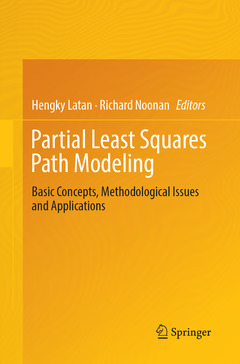Partial Least Squares Path Modeling, Softcover reprint of the original 1st ed. 2017 Basic Concepts, Methodological Issues and Applications

This edited book presents the recent developments in partial least squares-path modeling (PLS-PM) and provides a comprehensive overview of the current state of the most advanced research related to PLS-PM. The first section of this book emphasizes the basic concepts and extensions of the PLS-PM method. The second section discusses the methodological issues that are the focus of the recent development of the PLS-PM method. The third part discusses the real world application of the PLS-PM method in various disciplines. The contributions from expert authors in the field of PLS focus on topics such as the factor-based PLS-PM, the perfect match between a model and a mode, quantile composite-based path modeling (QC-PM), ordinal consistent partial least squares (OrdPLSc), non-symmetrical composite-based path modeling (NSCPM), modern view for mediation analysis in PLS-PM, a multi-method approach for identifying and treating unobserved heterogeneity, multigroup analysis (PLS-MGA), the assessment of the common method bias, non-metric PLS with categorical indicators, evaluation of the efficiency and accuracy of model misspecification and bootstrap parameter recovery in PLS-PM, CB-SEM, and the Bollen-Stine methods and importance-performance map analysis (IPMA) for nonlinear relationships. This book will be useful for researchers and practitioners interested in the latest advances in PLS-PM as well as master and Ph.D. students in a variety of disciplines using the PLS-PM method for their projects.
Dedication.- Foreword.- Preface.- Table of Contents.- Part I: Basic Concepts and Extensions.- Partial Least Squares: The Gestation Period (Richard Noonan).- Partial Least Squares Path Modeling: Updated Guidelines (Jörg Henseler, Geoffrey Hubona, and Pauline Ash Ray).- Going Beyond Composites: Conducting a Factor-Based PLS-SEM Analysis (Ned Kock).- The Perfect Match between a Model and a Mode (Theo K. Dijkstra).- Quantile Composite-Based Model: A Recent Advance in PLS-PM (Cristina Davino, Pasquale Dolce, and Stefania Taralli).- Ordinal Consistent Partial Least Squares (Florian Schuberth and Gabriele Cantaluppi).- Part II: Methodological Issues.- Predictive Path Modeling through PLS and Other Component-Based Approaches: Methodological Issues and Performance Evaluation (Pasquale Dolce, Vincenzo Esposito Vinzi, and Carlo Lauro).- Mediation Analyses in Partial Least Squares Structural Equation Modeling: Guidelines and Empirical Examples (Gabriel Cepeda, Christian Nitzl, and Jose Luis Roldán).- Treating Unobserved Heterogeneity in PLS-SEM: A Multi-Method Approach (Marko Sarstedt, Christian M. Ringle, and Joe F. Hair).- Applying Multigroup Analysis in PLS-SEM: A Step-by-Step Process (Lucy Matthews).- Common Methods Bias: A Full Collinearity Assessment Method for PLS-SEM (Ned Kock).- Integrating Non-Metric Data in Partial Least Squares Path Models: Methods and Application (Francesca Petrarca, Giorgio Russolillo and Laura Trinchera).- Model Misspecifications and Bootstrap Parameter Recovery in PLS-SEM and CBSEM based Exploratory Modeling (Pratyush N. Sharma, Ryan Pohlig, and Kevin H. Kim).- Part III: Applications.- Personality, Intellectual Ability, and the Self-Concept of Gifted Children: An Application of PLS-SEM (R. Frank Falk).- Ethical Awareness, Ethical Judgment and Whistleblowing: A Moderated Mediation Analysis (Hengky Latan, Charbel Jose Chiappetta Jabbour and Ana Beatriz Lopes de Sousa Jabbour).- Latent Variable Regression for Laboratory Hyperspectral Images (Paul Geladi, Hans Grahn, and Kim H. Esbensen).- Dealing with Nonlinearity in Importance-Performance Map Analysis (IPMA): An Integrative Framework in a PLS-SEM Context (Sandra Streukens, Sara Leroi-Werelds, and Kim Willems).- Appendix.- About the Authors.- Index.
Hengky Latan graduated in 2016 in Accounting (summa cum laude) at the Diponegoro University, Semarang, Indonesia. He worked at the STIE Bank BPD Jateng in the Department of Accounting, and at the Petra Christian University. He authored several books including multivariate statistics with IBM SPSS, Stata and PLS-SEM with SmartPLS, WarpPLS, and XLSTAT-PLSPM and GSCA. His articles were published in a number of journals including Industrial Marketing Management, International Journal of Production Research, Journal of Business Ethics, Journal of Cleaner Production, the Technovation, Transportation Research Part E, Sustainability Accounting, Management and Policy Journal,Total Quality Management and Business Excellence. He also attended conferences such as the Academy of Management (AoM), the British Academy of Management (BAM), and EurOMA.
Richard Noonan studied Economics of Education at Columbia University, NY (Ed. D.) and Stockholm University, Sweden (Ph. D.). He served as research officer with the International Association for the Evaluation of Educational Achievement (IEA) and later as Associate Professor at the Institute of International Education, Stockholm University, Sweden. As an education economist, he served as consultant to UNESCO, World Bank, Asian Development Bank, the International Labour Organization, and many other multilateral and bilateral international development agencies. Noonan published numerous articles and several books on education systems, with an emphasis on quantitative analysis, including the use of PLS in the analysis of education and training systems. He retired in 2012 and devotes his time to writing.
Date de parution : 08-2018
Ouvrage de 414 p.
15.5x23.5 cm
Thèmes de Partial Least Squares Path Modeling :
Mots-clés :
partial least squares path modeling; PLS-SEM; structural equation modeling; predictive path modeling; PLS and computing; factor-based PLS-SEM; consistent ordinal partial least squares; unobserved heterogeneity; hierarchical analysis; partial least squares with latent variables; analysis of mediation; PLS path modeling for non-metric data



